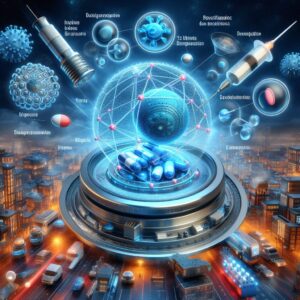Nanotechnology has emerged as a pioneering force in medicine, unlocking a realm of possibilities in the precise delivery of therapeutic agents within the human body. Within this revolutionary landscape, targeted drug delivery systems engineered at the nanoscale offer a transformative approach to administering medications. Let’s explore how nanotechnology is reshaping medicine by Revolutionizing Medicine, precision, and safety of drug delivery.

Precision at the Nanoscale
The essence of targeted drug delivery lies in precision. Nanotechnology harnesses the properties of nanoparticles—particles measuring less than 100 nanometers—to create carriers capable of ferrying drugs directly to specific cells, tissues, or organs. These nanoparticles can be engineered with precision, enabling them to navigate the intricate pathways of the body and deliver medications to targeted sites with remarkable accuracy.
Enhancing Efficacy and Minimizing Side Effects
Traditional drug delivery systems often face challenges with drug distribution and off-target effects. Nanotechnology revolutionizes this by encapsulating drugs within nanoparticles, shielding them from degradation and facilitating controlled release at the intended site.
Customization and Personalized Medicine
The versatility of nanotechnology allows for the customization of drug delivery systems. Nanoparticles can be tailored to carry different types of drugs, including chemotherapy agents, gene therapies, or antibodies, catering to diverse medical needs. Furthermore, this customization potential paves the way for personalized medicine.
Challenges and Future Directions: Revolutionizing Medicine
While the promise of nanotechnology in drug delivery is immense, challenges such as nanoparticle stability, manufacturing scalability, and potential toxicity need to be addressed. However, ongoing research and advancements aim to overcome these hurdles.
Nanotechnology’s foray into medicine has ushered in a groundbreaking era in drug delivery, wielding nanoparticles as precise carriers to revolutionize treatment approaches. Operating at a scale unimaginably small, these nanoparticles navigate the intricate pathways of the body. Engineered with exactness, they ferry therapeutic agents directly to specific cells or tissues, marking a pivotal shift towards precision medicine.
The crux of this innovation lies in its ability to augment drug efficacy while mitigating adverse effects. Nanoparticles shield medications, ensuring their safe passage to targeted sites. By encapsulating drugs and enabling controlled release, nanotechnology enhances the therapeutic impact while minimizing collateral damage to healthy tissues.

Furthermore, nanotechnology’s adaptability is its hallmark. Custom-designed nanoparticles accommodate diverse medications, from traditional chemotherapy agents to advanced gene therapies, offering a spectrum of treatment possibilities. This versatility hints at the dawn of personalized medicine, where treatments are tailored to suit individual molecular profiles.
Yet, as nanotechnology progresses, challenges persist. Nanoparticle stability, manufacturing scalability, and safety concerns necessitate ongoing research and development efforts. Nonetheless, the promise of nanomedicine in targeted drug delivery stands as a beacon of hope, offering a glimpse into a future where treatments are not just efficient but exquisitely precise.
Conclusion: A New Frontier in Medicine
Nanotechnology’s role in targeted drug delivery heralds a new era in medicine. By leveraging the precision of nanoparticles, this technology promises enhanced treatment efficacy, minimized side effects, and the potential for personalized therapeutic interventions. As research and development continue to unravel the complexities and possibilities of nanomedicine.
For more Article like this, visit our Website Here
